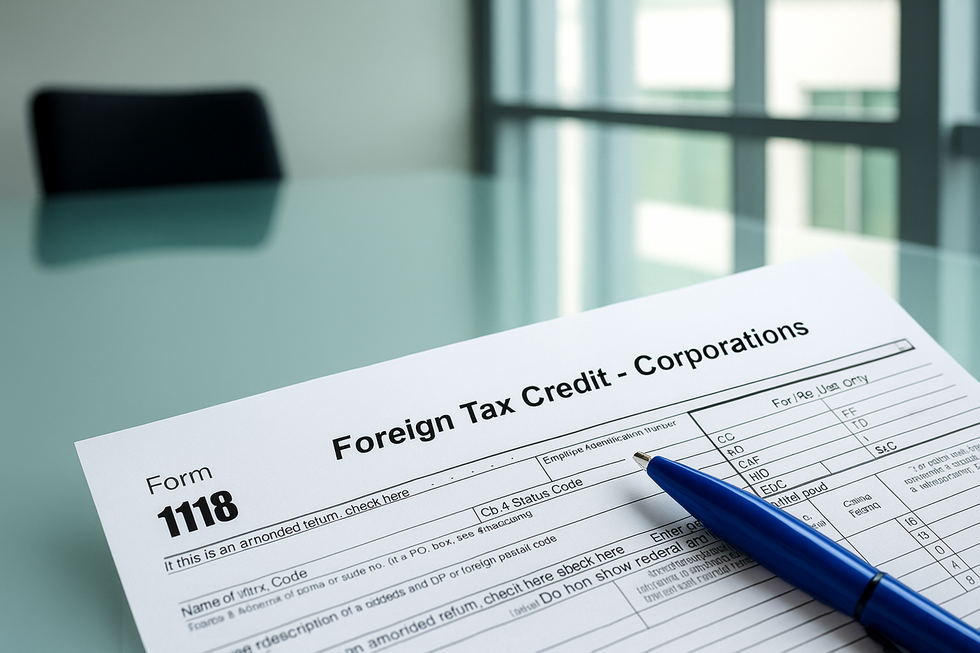Form 1118: A comprehensive guide for corporations seeking foreign tax credits

This article is for informational purposes only and does not constitute legal or tax advice.
Always consult with a tax professional for your specific circumstances.
One of the essential tax forms that corporations with foreign operations should be familiar with is Form 1118.
This form allows U.S. corporations to claim foreign tax credits, ensuring they aren't taxed twice on the same income.
In this guide, we'll delve deep into the nuances of Form 1118, its importance, and how to correctly file it.
What is Form 1118?
Form 1118 is used by corporations to compute their foreign tax credit for certain taxes paid or accrued to foreign countries or U.S. possessions.
Essentially, it's a mechanism that prevents double taxation of the same income by both the U.S. and a foreign country.
"Any corporation that elects the benefits of the foreign tax credit under section 901 must complete and attach Form 1118 to its income tax return." - IRS
Why is Form 1118 important?
When U.S. corporations operate in foreign countries, they often pay taxes in those countries. Without a system in place, this income would also be taxed by the U.S., leading to double taxation.
Form 1118 allows corporations to claim credits for taxes paid abroad, reducing their U.S. tax liability.
Who should file Form 1118?
Any U.S. corporation with operations in foreign countries that has paid or accrued taxes in those countries should consider filing Form 1118.
Pro Tip! Filing Form 1118 is voluntary: there are no penalties for not filing, but corporations might miss out on potential tax credits.
How to file Form 1118
Filing Form 1118 can be complex. The IRS estimates that it takes about 25 hours to complete.
Here's a step-by-step guide to help you navigate the process:
- Gather necessary information: This includes details about the company, its income, foreign taxes paid (converted into U.S. dollars), and foreign tax credit computations.
- Complete the form: Form 1118 consists of 7 pages containing schedules A-K. Ensure all sections are filled out accurately.
- Attach to your income tax return: Once completed, attach Form 1118 to your corporate income tax return.
NOTE! It's advisable to seek assistance from a tax specialist, especially if you're unfamiliar with the intricacies of the form. An expert can ensure accuracy and maximize your foreign tax credits.
Form 1118 preview
Key aspects of Form 1118
Understanding Form 1118 requires a deep dive into its various components.
Here are some of the key aspects of Form 1118 that corporations should be aware of:
Categories of income
There are 4 primary categories of income for Form 1118, each with its own set of rules and implications:
- Passive Category Income: This includes income such as interest, dividends, rents, royalties, and annuities. It's primarily income that doesn't come from active business operations but rather from investments or other passive activities.
- Section 901(j) Income: Income derived from specific countries with which the U.S. doesn't have diplomatic relations or which support terrorism. NB! The foreign tax credit is generally disallowed for taxes paid to these countries.
- Income Re-sourced by Treaty: Some income may be treated as arising in the U.S. due to a tax treaty. This re-sourced income can affect the foreign tax credit calculation.
- General Category Income: This is a catch-all category that includes active business income and other types of income not specifically listed in the other categories.
Carryback and carryforward of excess foreign taxes
If a corporation's allowable foreign taxes paid exceed the foreign tax credit limitation for a specific year, there's a mechanism in place to ensure these credits don't go to waste.
The excess can be carried back 1 year, providing a potential refund for taxes paid in that previous year. If the credits can't be utilized in the carryback year, they can be carried forward up to 10 years, offsetting future tax liabilities.
This ensures that corporations get the full benefit of the taxes they've paid abroad over time.
Drowning in tax details?
Get your free tax consultation
Additional considerations for expat business owners
American expat business owners might have other reporting requirements related to FBAR and FATCA rules. For instance, FBARs must be filed if an American has signatory over foreign financial accounts exceeding $10,000 at any time during the year.
Additionally, FATCA rules require Americans with foreign financial assets to report them on IRS Form 8938.
Bottom line
Form 1118 is an essential tool for U.S. corporations with foreign operations. By understanding its purpose and how to file it correctly, corporations can ensure they aren't paying more in taxes than necessary.
Always consider seeking expert advice to navigate the complexities of the U.S. tax system.

Stay IRS-compliant with your business abroad – we’re ready to help


